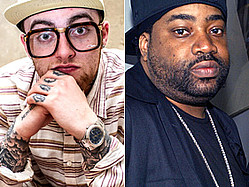In 2010, a little known Mac Miller released an ear-catching digital single called "Kool Aid & Frozen Pizza," a retread of Lord Finesse's 1995 single "Hip 2 Da Game." Now, two years later, the '90s rap icon is looking for his just due by filing a $10 million lawsuit against Miller, Rostrum Records and DatPiff.com.
Courthouse News Service broke the news on Monday. "This is a case about a teenage rapper — Mac Miller — copying the music from a song written, produced and performed by Lord Finesse, a hip hop legend, changing the title and then distributing it under his own name in order to launch his music career," the complaint received by CNS states.
Sample clearance issues have plagued hip-hop artists since Biz Markie's 1991 track "Alone Again," a song included on his I Need a Haircut retail LP, resulted in a landmark case brought by Gilbert O'Sullivan, whose "Alone Again (Naturally)" was sampled in the song.
But the case of Miller and Lord Finesse is different. Miller's "Kool Aid & Frozen Pizza," though widely popular on the Internet, was distributed at no charge as part of his free Internet mixtape K.I.D.S. (Kickin' Incredibly Dope Sh--). It's a practice that has helped propel the careers of many of today's top rap stars, including 50 Cent, Drake and Lil Wayne.
"In 2010, Mac Miller recorded himself rapping over Finesse's music and renamed the song 'Kool Aid & Frozen Pizza' ('The Kool Aid Song')," the complaint reads.
On Tuesday Mac took to Twitter to set the record straight. "1. I made that record and video as nothing more than an 18 year old kid who wanted to rhyme and pay homage, no other intentions," he tweeted. "2. Finesse and I spoke on the phone for an hour after he heard the record and cleared the air. We even planned to work on music together."
Miller went on to tweet that Finesse, who based "Hip 2 Da Game" around a portion of Oscar Peterson's 1971 jazz record "Dream of You," never actually cleared the sample from the original composer. Still, Mac said that he has love for Finesse, citing the producer's work with the late Big L, one of the youngster's chief musical influences. "Lord Finesse, thank you for what u did for hip hop," he wrote. "Thank you for bringing my favorite rapper into the game."
"This case is about the overall picture. If you're just looking at 'one' point ... It's about so much more #look deeper," Finesse tweeted, suggesting that his gripe is about more than just Miller's free mixtapes.
Before the music video for Mac's "Kool Aid" was taken down, it had garnered more than 20 million views on YouTube. In his suit, Finesse is alleging copyright infringement, unfair competition, unjust enrichment, interference, deceptive trade practices and a host of other claims related to state copyright law.
Should Mac Miller have to pay Lord Finesse for the use of his music? Let us know in the comments!









